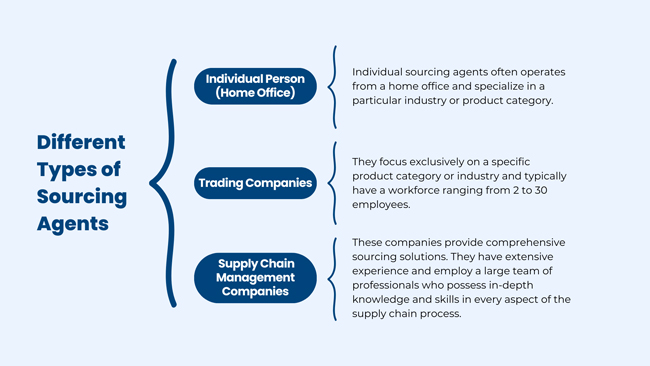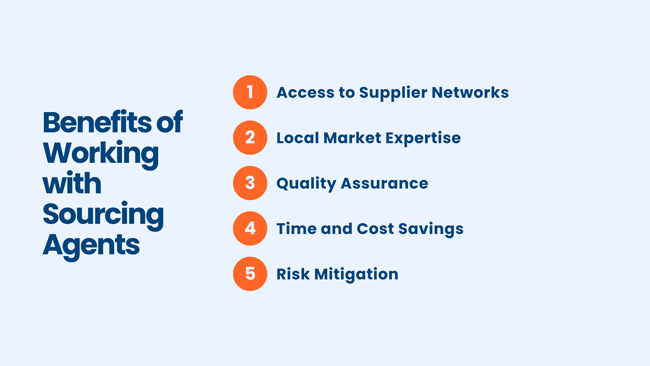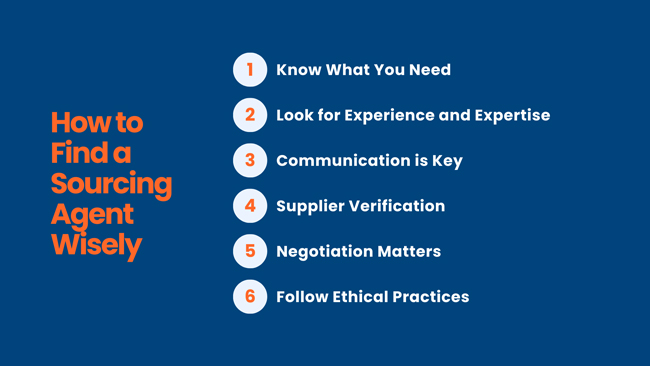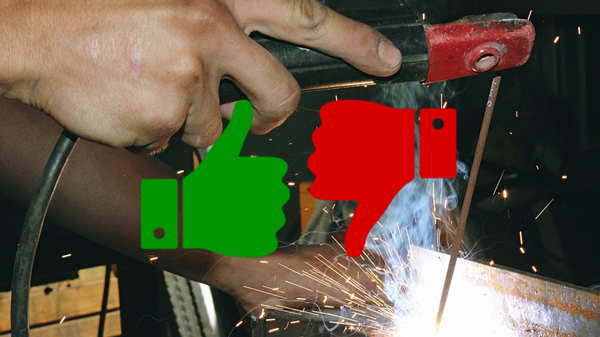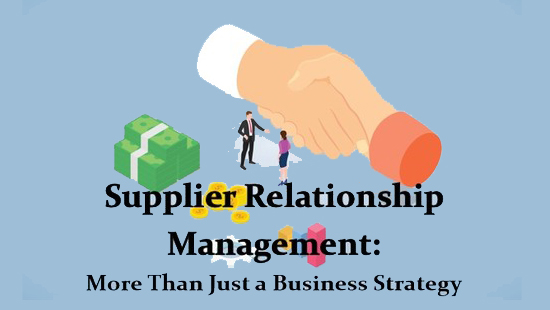What Does a Sourcing Agent Do? How Much Do They Charge?
- Date:
- Author: SVI Content Team
- Share:

Finding reliable suppliers and manufacturers for your manufacturing business can be a real headache. There’s so much to consider – factory compliance, product prices, quality assurance, testing compliance, IP production, collaboration efficiency, delivery time, language barriers, and more. This is where a sourcing agent comes into play. A sourcing agent acts as a bridge between businesses and suppliers. They scour the market, vet potential suppliers, and hook you up with the perfect match.
But what exactly do sourcing agents do, and how much do their services cost? In this article, we’ll explore things about sourcing agents – the good, the bad, and the bottom line, to help you understand their role and value. Let’s step into the next!
Part 1. What Is a Sourcing Agent?
In the global supply chain, a sourcing agent is a professional or company that offers services to help businesses find suitable materials, products, and suppliers in the global market.
The role of product sourcing agents is particularly valuable for companies looking to source overseas as usually, they have local offices or representatives in the target market. This proximity helps overcome challenges like language barriers, cultural differences, and unfamiliar business practices.
Different Types of Sourcing Agents
1. Sourcing Agent – Individual Person (Home Office)
This type of sourcing agent is an independent individual who operates from a home office. Individual sourcing agents often specialize in a particular industry or product category. They offer a personalized approach and are flexible in adapting to unique sourcing requirements.
However, they have limited resources and networks compared to larger companies, constraining their capacity to handle large-scale projects.
⭕ Pros:
- Personalized Approach
- Flexibility
❌ Cons:
- Limited Resources and Networks
- Capacity Constraints for a single person to cover sourcing, product development, factory audit and quality inspection
- Risk of Dependency
2. Sourcing Agent – Trading Companies
Trading companies focus exclusively on a specific product category or industry and typically have a workforce ranging from 2 to 30 employees. They have established networks of suppliers and manufacturers within their niche.
These sourcing companies offer comprehensive sourcing services, including supplier selection, negotiation, quality control, and logistics.
However, it’s important to note that some product-sourcing companies may have established investment relationships with factories, potentially leading to biased decision-making in conflicts.
⭕ Pros:
- Specialized Expertise
- Established Supplier Networks
- Competitive pricing in their particular product category
❌ Cons:
- Potential Bias Due to Investment Ties
3. Sourcing Agent – Supply Chain Management Companies
Supply chain management companies provide comprehensive sourcing solutions. They have extensive experience and employ a large team of professionals who possess in-depth knowledge and skills in every aspect of the supply chain process.
These companies handle all aspects of the sourcing process, including manufacturer sourcing, product development, negotiation, quality control, factory compliance audit, production management, and logistic arrangements, helping to streamline operations and optimize efficiency.
⭕ Pros:
- Specialized Expertise
- Comprehensive Solutions
- Extensive Experience and Expertise
- Streamline Operations
- Transparent On all Factory Problems
❌ Cons:
- Higher Service Price
Part 2. What Does a Sourcing Agent Do?
At its core, the role of a sourcing agent revolves around assisting businesses in finding and connecting with suitable suppliers and manufacturers. They are knowledgeable professionals who possess expertise in the sourcing process and have a network of contacts within the industry. They take care of all the operations from product sourcing to product delivery, they work as the on-the-ground office in the factory time zone on behalf of you.
Sourcing Agents: Roles and Responsibilities
Here’s what a sourcing agency undertakes:
- Requirement Analysis: The agents thoroughly analyze the client’s sourcing needs, product specifications, and budget to source for the most appropriate suppliers and manufacturers.
- Supplier Negotiation: The sourcing company will engage in negotiation on behalf of clients and get the best prices, terms, and conditions from suppliers by using their expertise.
- Factory Compliance: They will have auditors to vet your factories, including Social Compliance, Quality System, C-TPAT Security Audit, Retailer Specific Audit, and the Licensor Specific Audit.
- Product Development: They collaborate with your design team and factory to develop new products with their expertise of engineering including prototyping, sampling, tooling, sample testing and evaluation, packaging design, cost analysis , and patent filing.
- Quality Assurance: They will conduct regular inspections and factory visits to ensure that manufactured products meet the required standards. This helps mitigate risks of quality issues and maintain the desired level of quality.
- Production Management: They will evaluate the factory production capacity and make the production plan to meet your delivery schedule.
- Logistics Management: They take care of logistical aspects such as shipping, customs clearance, and transportation. They coordinate with suppliers and logistics providers to ensure on-time delivery.
Overall, a manufacturing sourcing agent acts as a trusted advisor and a reliable partner, guiding businesses through the entire sourcing process, from supplier selection to final delivery.
Sourcing Agents vs. Supply Chain Management Companies
Sourcing Agents: Focusing on Suppliers
Sourcing agents typically concentrate on individual suppliers or a select few within a specific product category. Their primary goal is to identify and engage with suppliers who can meet the business’s procurement needs.
Here are the key characteristics of sourcing agents:
- Specialized in specific product categories
- Supplier-centric approach
- Limited scope, primarily address the immediate supplier-related concerns
Supply Chain Management Companies: Taking a Holistic Approach
Supply chain management takes a comprehensive view of the entire supply chain network, extending beyond individual suppliers.
- Broad perspective, encompassing the entire network
- Focus on network optimization for overall supply chain performance improvement
- Offer the potential for quantifiable improvements by addressing customer pain points
Part 3. How Much Do Sourcing Agents Charge?
If you’re considering hiring a sourcing agent, it’s essential to understand their pricing models and the factors that can influence their fees.
Two Different Pricing Models
1. Commission-Based Model
In this model, sourcing agents charge a percentage-based commission on the total value of the purchase order or the goods sourced. The commission rate can vary depending on the complexity of the project, the size of the order, and the specific industry.
It is common for sourcing agents to negotiate a commission rate ranging from 3% to 10% of the total order value.
2. Flat Fee Model
Some sourcing companies prefer a flat fee structure, where they charge a fixed amount for their services. This model is often suitable for straightforward sourcing tasks or when the scope of work is well-defined. The flat fee can be determined based on factors such as the time and effort required, the complexity of the project, and the agent’s expertise.
Remember that these ranges are approximate and can vary widely. It is advisable to discuss pricing details and negotiate terms with the sourcing company to reach a mutually beneficial agreement.
Two Factors Affecting Sourcing Agent Fees
1. Product Complexity
Product sourcing agents may charge higher fees for products that involve intricate specifications, technical requirements, or specialized manufacturing processes. The complexity of the product can significantly impact the agent’s workload and expertise needed to find suitable suppliers.
2. Order Volume
The size of your order can influence the sourcing company’s fees.
Generally, high-volume orders may attract lower commission rates or discounted flat fees, as they offer higher revenue potential for the agent.
On the other hand, low volume orders may incur relatively higher fees due to the same amount of effort required for sourcing and supplier coordination.
Part 4. Why Should You Use a Sourcing Agent
As you wonder whether you should seek help from sourcing companies, here are some advantages of employing a product-sourcing agent for your supply chain.
Benefits of Working with Sourcing Agents
1. Access to Supplier Networks
Sourcing agents often have an extensive network of pre-vetted suppliers. They can connect you with reliable manufacturers, ensuring access to a wide range of products and potential cost savings.
2. Local Market Expertise
A global sourcing company possesses in-depth knowledge of local markets, including industry trends, pricing dynamics, and supplier capabilities. This knowledge enables them to identify the best sourcing opportunities and navigate cultural and logistical challenges.
3. Quality Assurance
A great sourcing company will prioritize product quality and conduct rigorous quality control processes. It performs factory audits and product inspections and enforces quality standards to ensure consistent product excellence.
4. Time and Cost Savings
Manufacturing sourcing agents with years of experience can streamline the sourcing process to save you time and effort. With their expertise, they negotiate competitive prices, manage logistics, and handle documentation, allowing you to focus on core business activities.
5. Risk Mitigation
Reliable sourcing companies help mitigate risks associated with supplier selection, product quality, and compliance. Their experience in due diligence and supplier verification minimizes the likelihood of encountering fraudulent or unethical suppliers.
Part 5. How to Find a Sourcing Agent Wisely
Finding and selecting the right product-sourcing company is crucial for the success of your procurement endeavors.
To achieve success in manufacturing sourcing, consider the following tips:
1. Know What You Need
Be clear about your specific needs and expectations. What product do you need? How much is your order volume? What are your product quality requirements? This helps you find a sourcing company that understands your industry and meets your unique needs.
2. Look for Experience and Expertise
Look for sourcing agents with a proven track record and extensive experience in your industry. Assess their knowledge of local markets, supplier networks, and understanding of manufacturing processes.
3. Communication Is the Key
Make sure the company communicates well. They should be responsive, clear, and understand your expectations and keep you updated on progress, potential issues, and any changes in the sourcing process.
4. Supplier Verification
A reputable sourcing agent should conduct thorough supplier verification processes. Assess supplier credibility, manufacturing capabilities, quality control systems, and compliance with industry standards. This ensures that you work with reliable suppliers who meet your quality requirements.
5. Negotiation Matters
A key role of a sourcing agent is negotiating great deals for you. Look for sourcing agents who are good at securing competitive pricing, favorable payment terms, and other benefits such as product customization or exclusivity. A skilled negotiator can achieve cost savings and obtain advantageous supplier agreements.
6. Follow Ethical Practices
Choose a sourcing agent committed to ethical business practices. They should adhere to legal and regulatory standards, promote fair labor practices, and care about environmental sustainability. Ethical sourcing is good for your company’s reputation and helps avoid unethical suppliers.
Part 6. FAQ about Sourcing Company
1. What Is the Sourcing Process?
The relationship between a sourcing company and a client is collaborative, so the process is tailored to specific needs. And the general steps are:
- Start the initial consultation
- Analyze clients’ needs
- Market research and get RFQs from suppliers
- Offer a sourcing solution
- Contract agreement and order placement
- Production management
- Project ongoing support
To know the common and specific details, you can refer to our Process.
2. What Additional Services Can Sourcing Companies Offer?
Beyond core sourcing activities, many companies offer additional services to enhance your supply chain management. As SVI Global, a sourcing agent in China, for example, additional services could be included:
- Product Development
- Project Management
- Factory Audits
- QC Inspection
- Production Management
- In-house Lab Product Testing
- In-house Photoshoot
- Freight Bookings
- Compliance and Regulatory Support
3. What Information Can Be Gained from a Sourcing Agency?
An international sourcing company can provide you with a wealth of information to make informed decisions. These include:
- Supplier Profiles
- Market Trends
- Pricing Data
- Quality Control Reports
- Cost Breakdowns
- Risk Assessments
4. Questions to Ask a Sourcing Company:
Keep the following questions in mind to evaluate whether or not the supplier you find is good:
- How long have you been in the sourcing business?
- What products can you source?
- Where can you source products from?
- Do you specialize in any specific product categories?
- What types of products have you sourced in the past?
- What is your service scope?
- Can we visit your offices?
- What is the process for vetting and selecting suppliers?
- Will we have direct communication with factories?
- How do you ensure the reliability and quality of suppliers and products?
- What quality control processes do you have for products?
- Can you provide references from past clients?
- Have you worked with businesses in our industry before?
- How do you manage cargo shipping? Are these fees included in your service?
- What are your payment terms? Do you charge an upfront fee or a commission on order value?
Final Thoughts
Sourcing agents play a vital role in connecting businesses with reliable suppliers, managing the procurement process, and ensuring the delivery of quality products. Choosing the right one can maximize the benefits and minimize risks associated with global sourcing.
A well-chosen sourcing agent can provide significant value to your business. Their industry knowledge, extensive networks, and negotiation skills help secure competitive pricing, favorable terms, and access to a wide range of suppliers. With their local presence, it is easy to tackle the cultural and logistical challenges, ultimately saving you time and effort.
Why Choose SVI Global as Your Sourcing Partner?
So, have you decided which product sourcing agent to work with? In global product sourcing, gaining unique perspectives in the manufacturing areas in Asia and Mexico is crucial.
SVI Global, being a player in the manufacturing industry for more than 20 years, is here to be that trusted partner for your business.
With our Western ownership and management, we understand the unique challenges and requirements of businesses looking to source, produce, and expand outside of the office country. Our Asia (China, Vietnam, Malaysia, Indonesia, and Korea) and Mexico sourcing team is ready to support you in various aspects of your business operations.
Imagine having a personal team that handles sourcing, cost negotiation, product development, production management, quality assurance, and shipping – all under one roof. SVI Global makes it possible by providing you with a single point of contact for all your business needs.
At SVI Global, we are dedicated to helping our clients do business more effectively. Your success is our priority. Take the next step and Contact Us today to discuss your specific requirements.

